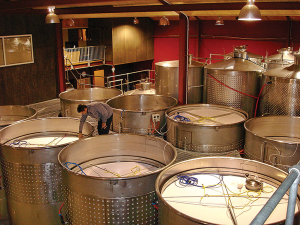One of the questions the PwC Strategic Review asked during its study of the New Zealand wine industry, was centered on business models.
How are they evolving and what are the implications for the industry overall? Tessa Nicholson looks at the findings.
New Zealand’s wine industry is small on an international scale, and it appears the make-up of our industry follows suit.
The PwC report on business models shows that 87 percent of this country’s wineries fall into the category of small – which means they have sales of less than 200,000 litres.
Medium sized wineries, those with sales of 200,000 – 4 million litres make up 10 percent of wineries, while large scale (sales of over 4 million litres) make up just three percent of wineries.
However the figures are turned on their head when you look at the percentage of exports each category is responsible for.
Small exports – 14 percent
Medium exports – 22 percent
Large exports – 64 percent
The number of large-scale wineries has increased significantly in the past decade, going from just six in 2008 to 17 in 2018. However, the report points out that small wineries are an integral part of the New Zealand wine story.
“Smaller players add variety to the New Zealand wine story and often generate innovations in production and wine styles.”
Larger players though
are helping to build the reputation of New Zealand internationally, through marketing and reach.
Grower numbers in New Zealand have dropped significantly from a peak of 1,128 in 2010 to 699 in 2018. That drop in numbers (28 percent) is despite the 27 percent increase in plantings throughout the country. The report says this is a sign of the consolidation that has been occurring with growers looking to take advantage of economies of scale.
In terms of moving forward, PwC says there are a number of trends that are changing the face of the New Zealand wine industry.
They include outsourcing bottling and packaging, using contract wineries to create new labels, a decrease in the number of wholesalers, distributors and importers, a decrease in grower numbers but an increase in the size of their holdings, and the ability of wineries to sell direct to the consumer.
All of these are helping to reduce certain costs, and provide business flexibility.
Another facet of the report on business models, is how foreign owned wine industry companies play a strategic role in New Zealand.
While close to half of all the large-scale wineries are owned by foreign entities, they are also responsible for over a third of all New Zealand wine sales.
There are other positives associated with the foreign owned companies – number one being they tend to pay growers more for their fruit, than New Zealand owned companies.
The PwC report also points out that foreign owned companies export less wine in bulk format, than New Zealand owned wineries – just 31.7 percent of the total of all unpackaged wines.
The ability of foreign entities to invest in the New Zealand economy cannot be underestimated. They have helped increase plantings, as well as provided employment opportunities in wine growing regions. Then there is their ability to find routes to market and introduce technology from their home countries.
“The scale and global networks of foreign owned entities help to build the reputation and presence of all New Zealand wine, benefitting the entire industry.
“Technology transfer and global knowledge permeates and (is) shared with local industry,” the report states.
In terms of what New Zealand Winegrowers can do to support business model success and diversity, PwC highlights the need for educating members on profitability.
“There is a weak case for further NZW involvement in business model success given free market mechanisms.”
|
V17 $/Tonne
|
Winery Ownership
|
|
|
New Zealand
|
Foreign
|
All
|
|
MB SB
|
$1,702
|
$1,804
|
$1,732
|
|
Other grapes
|
$1,675
|
$2,086
|
$1,811
|
|
All grapes
|
$1,695
|
$1,886
|
$1,753
|
The full PwC Strategic Review, is available on the nzwine.com, members website.














